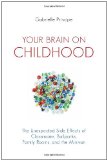new book – ‘Your Brain on Childhood: The Unexpected Side Effects of Classrooms, Ballparks, Family Rooms, and the Minivan’
Written on August 28, 2011
Your Brain on Childhood: The Unexpected Side Effects of Classrooms, Ballparks, Family Rooms, and the Minivan by Gabrielle Principe (Prometheus Books, 2011)
Book description from the publisher:
For more than 99 percent of human existence childhood was spent in a natural environment. Children spent their days roaming in packs and playing on their own in the out-of-doors. They improvised their play, invented games, and made up their own rules. Education was informal and new skills were learned through interacting with peers and encountering the natural world.
Today, infants find themselves strapped into bouncy seats and plunked in front of the TV set; preschoolers are given talking doll houses and battery-powered frogs that teach them their ABCs; and older children sit in front of computers with iPods in their ears texting friends.
Although such artificial environments have made life easier and more secure for children, scientists are finding that this new lifestyle is having unwanted side effects on children’s brains. In Your Brain on Childhood, developmental psychologist Gabrielle Principe reviews the consequences of raising children in today’s highly unnatural environments and suggests ways in which parents can learn to naturalize childhood again, so that a child’s environment gels with how the brain was designed to grow.In a clearly presented, accessible narrative, Principe marshals scientific evidence from a wide array of fields to explain why there is a disconnect between the brain’s evolutionary history and the technology-centered present. Research from both human and animal studies indicates that brain development is fostered by consistent opportunities for face-to-face communication and freewheeling pretend play.
The startling implication is that today’s structured, controlled, and fabricated surroundings are exactly wrong for developing brains. Instead of emphasizing technology and organized activities, parents and teachers could better help children learn by encouraging exploration, experimentation, and exposure to the real world. Recess, now often dismissed as a waste of time, should be considered an essential part of children’s cognitive and social development; lessons should be individualized as much as possible; and the current focus on homework and letter grades should be de-emphasized and eventually eliminated altogether.
Fascinating and controversial, this well-researched discussion by an expert on child development will make parents and school systems rethink how we are raising our children.
Filed in: culture,new books,psychology.



